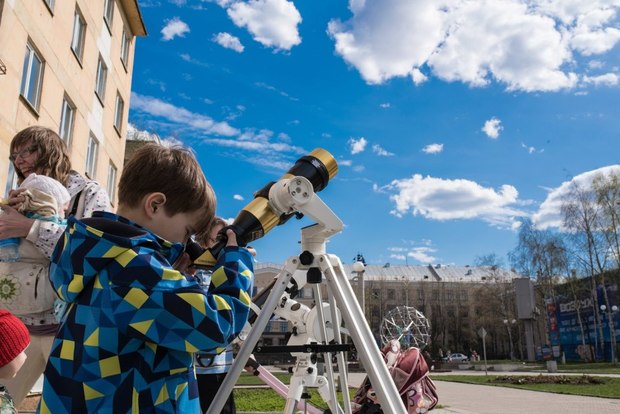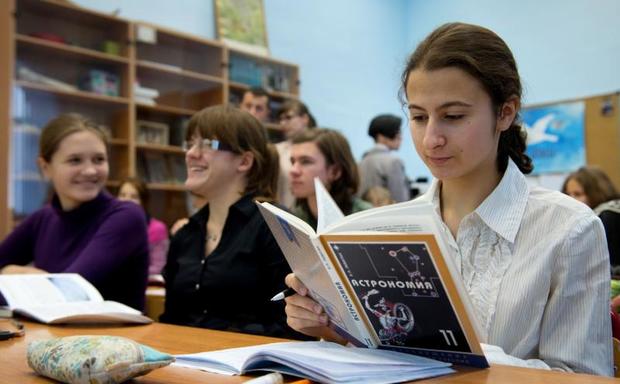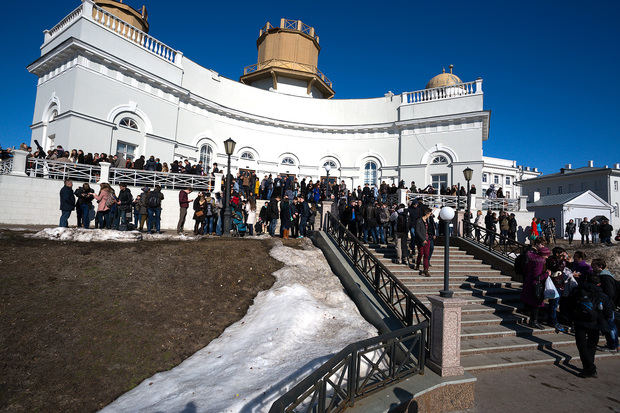Schoolchildren to be fostered immunity to pseudo-science: Astronomy is back to timetable
The Russian Ministry of Education announced introduction of compulsory subject from 1 September
Astronomy is back to Russian schools, not like an optional course but compulsory. The subject was added to the federal component of the State Educational Standard. The Ministry of Education and Science of Russia gave local educational organisations one year for activation. Every school has the right to make a decision on its own– whether to include Astronomy to timetable from 1 September 2017 or 1 January 2018. The real readiness of schools for quality teaching this subject is the decisive factor here. It is supposed that Physics teachers will teach Astronomy. They will have to take advanced training courses for it. Realnoe Vremya tells the details.
Immunity to pseudo-science
Astronomy as an independent subject was added to the educational plan at Soviet schools in 1932. 1 hour a week was given for studying in the 10 th grade. The ideological importance of the subject was especially noted.
Astronomy was crossed out from the list of compulsory subjects in 1993. Though some schools continued to study it, it was optional. Kids knew about the space in integrated courses in the majority of educational establishments until today. Astronomy like the simplest idea about the world was included as Environment in primary and Physics in high schools.
The subject is back in 2017, not as an optional course but compulsory. Astronomy, according to the Ministry of Education and Science's presentation, motivates to study Physics and Maths besides understanding the organisation of the world outside the Earth and also fosters ''immunity'' to pseudo-science and pseudo-scientific sensations.

No state astronomy exam is planned though questions from the course will be included in state physics exam
The Russian Ministry of Education and Science gave schools one year for activation. Every school has the right to make a decision on its own – whether to include Astronomy to timetable from 1 September 2017 or 1 January 2018. The real readiness of schools for quality teaching this subject is the decisive factor here. Methodical recommendations sent to regions by the Russian Ministry of Education and Science deliberately pay attention that studying Astronomy as compulsory subject is ''introduced depending on the creation of corresponding conditions in educational establishments''.
At the same time, the ministry recommends to introduce Astronomy for the 11 th grade pupils at schools where Astronomy was studied optionally (according to the Law on Education, 50% of hours are formed by the federal centre and 25% — by region and school) from 1 September 2017.
The astronomy course must be no less than 35 hours a year. In other words, it is one lesson a week if the subject is taught in the 10 th or 11th grade and one lesson per two weeks if the course is extended to two years – it is also possible. It is up to schools to decide.
State astronomy exams including voluntarily are not planned. But all-Russian astronomy tests will be held from 2019, and tasks on the subject will be included in the state physics exam.
When the Sun revolves around the Earth
Nobody has cancelled the law of conservation of energy, and the question whether the addition of one subject to the timetable will exclude another one was given to schools by the Russian Ministry of Education and Science: ''An educational organisation independently redistributes hours in the educational plan within norms of educational load''. Astronomy won't overload schoolchildren, Deputy Director of the Department of Astronomy and Space Geodesy of the Institute of Physics of the Kazan Federal University Ilfan Bikmaev thinks. On the contrary, it will help to enrich with knowledge. He approves the introduction of the subject.
''There are gaps in knowledge, social surveys showed that some worldview aspects are lost. Answering a question what revolves around what, many people – not only kids but also adults – replied that the Sun revolved around the Earth. It is sad to hear it, of course. Who will teach? It is another question,'' Bikmaev says.
According to the All-Russian Public Opinion Research Centre, one in two Russian citizens thinks that not the Earth revolves around the Sun but the Sun around the Earth. The research had been lasting for several years. And each time Russians demonstrated wonderful ''knowledge''.
Physics teachers to become astronomers
The Kazan Federal University was charged with preparing future astronomy teachers. We are not speaking about graduates of the specialised department – they won't be sent to schools. We mean advanced training courses for teachers. Physics teachers are likely to have the new subject.
''We and the Ministry of Education will discuss how to organise these lessons methodically. Our department will help. The school course programme has been approved, even the book is known, Viktor Charugin is its author. Physics teachers are likely to teach Astronomy. They are closer to this subject. This year it is planned to introduce the course stage by stage, perhaps not the whole at once. The Tatarstan Ministry of Education will decide whether it will be at all the schools or an experiment in some of them,'' Bikmaev says.

The Ministry of Education of the republic could not comment on how the introduction of the new subject to the educational programme – all the experts are busy with preparation for the regional pedagogical council, which will be on 15 August.
''We don't think it must be right off the bat. Measures to return Astronomy to schools need to be gradual. This subject has been absent in the last 15 years, it is difficult to return it within a month,'' Ilfan Bikmaev says.
For stars – from Novye Chechkaby village
However, it doesn't depend on the education ministry when Astronomy returns to schools and how. Tatarstan has a wonderful example when countryside pupils became medallists of the All-Russian Astronomy Olympiad even if this subject was absent in the timetable.
By now former director of Novo-Chechkabskaya School in Buinsk District opened astronomy classes several years ago. He bought a telescope for his own money and offered schoolchildren to look at stars. The fun gradually grew into the interest in science. The school won a scholarship that was used to buy a more serious telescope, the astronomy room where tens of schoolchildren studied was equipped. Today's director of the school Rustem Bikmullin thinks it won't be difficult to introduce the subject in schools.
''It is not difficult to organise one lesson per week. There is a regional component thanks to which one can find resources,'' Rustem Bikmullin tells.

''Astronomy develops worldwide. We would like astronomy to develop in Russia as science as well''
Despite the lasting absence of Astronomy in the educational programme, the interest in the subject has not been lost. During the previous enrollment campaign to the department, there were 7 people per seat. However, there are not many seats – just 15. The applicants had 230-240 points on average. ''Of course, the general level was a bit lowered due to the absence of Astronomy at schools. But we recovered it during the first year,'' the deputy director of the department says. He hopes there will be more interested applicants with the introduction of Astronomy at schools.
''Interest in astronomy has grown worldwide in the last years – new spacecraft is sent, telescope and observatories are built. Astronomy develops worldwide. We would like astronomy to develop in Russia as science as well,'' Ilfan Bikmaev says.
The astronomy department of the Kazan Federal University is preparing for participation in a project of Spektr-RG international Russian-German orbital observatory under the aegis of the Russian Academy of Sciences' Space Research Institute. The Kazan Federal University will provide terrestrial optical support via telescope that was installed in Turkey. It is planned that launch of Spektr to orbit will be in September 2018. The goal of the project is to examine black holes, neutron stars, explosion of supernova and galactic nuclei. Over a million of new active galactic nuclei and up to 100,000 new galactic clusters are to be discovered during the research.